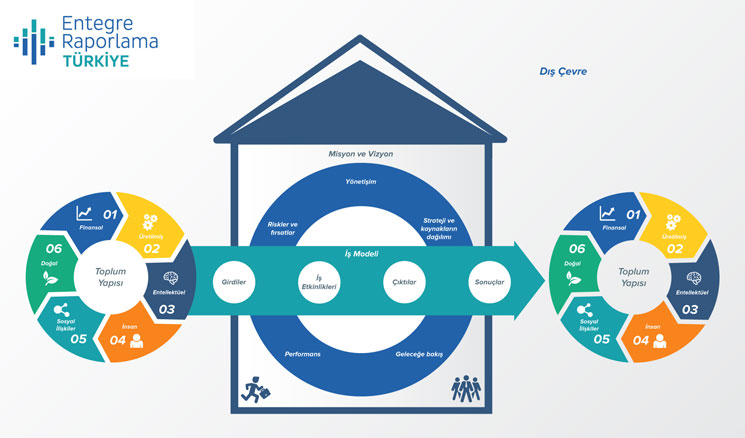Integrated Reporting
Why Integrated Reporting?
From Companies’ Perspective
- Uniting financial data with social, governance and environmental data allows corporate strategies to be determined with a more holistic approach.
- Reporting the company’s performance in various areas of activity in an interconnected manner allows the Board to monitor the company’ activities more easily, enhances the cooperation between the senior management and the Board, and improves decision-making mechanisms.
- Having a wider perspective about the value created by the company ensures that the company adapts its strategies, resource distribution and governance accordingly.
- Offers a more prospective, long-term perspective rather than a short term one.
- Thanks to integrated reporting, companies can see not only the economic but also sustainability risks and therefore can make better risk analyses.
- Allows reduction of costs arising from analyzing financial and non-financial information separately.
- Allows sustainability issues to be included in the company’s decision-making mechanisms.
- Encourages different departments of the company to cooperate, and therefore eliminates repeated work.
- Encourages the development of innovation culture in the company.
- Strengthens stakeholder participation, thereby allowing the company to better understand the expectations of its stakeholders.
- Strengthens the company’s communication with its own staff as well as the external stakeholders. Communicating the created value to the employees better permits the employees to understand the common targets better and to be included in the processes, adds to the motivation and attachment of the employees.
- Sharing the performance of the company openly including both the positive and negative aspects adds to the stakeholders’ confidence, brand value and prestige.
- Reinforced transparency and high quality reporting strengthens investors’ confidence in the company, facilitates the company’s access to financing.
- Thanks to cost reduction, operational efficiency, increased brand value and innovation, companies gain competitive edge.
From Investors’ Perspective
Today, while making investment decisions, investors would like to see not only financial but also non-financial risks and to know how companies manage all of these risks and the value they create in the short, medium and long term. Integrated reporting offers a frame of all of the material information in the assessment of a company, thereby ensuring that the company’s performance is measured in a more holistic manner. While the share of tangible assets of a company decreases every day, a more holistic and transparent approach that includes the company’s strategy, business model and environmental, social and governance performance in informing the investors, alleviates uncertainty on the side of the investors.
- Ensures that the quality of the data used in reporting is enhanced and such data are interconnected; important issues are reported in line with the expectations of the investors.
- Offers reliable, holistic, standard and comparable data for the investors.
- Investors can discriminate the companies that have deep information about their material risks and opportunities and prefer companies with better risk and opportunity management for their investments.
From Other Stakeholders’ Perspective
- Ensures that the company gets to know all of its stakeholders better and determines a different communication method with each stakeholder and therefore strengthens communication with the stakeholders.
- Allows the company to display its relation with the supply chain and the way it creates value throughout such chain.
- Allows the suppliers to form closer relations with the company. Helps suppliers to raise awareness on sustainability. Improves cooperation with the supply chain.
- As the company better reflects itself and the value it creates to its stakeholders, young and talented people can get to know companies better and make their preferences for a work place more easily.
- Helps consumers to become more aware of sustainability issues and make more responsible choices.
- Adds to the social and environmental responsibility, influencing both the employees and the society.
“Companies that focus on competition only will be eliminated in the end while those focusing on creating value will grow each day.” Edward de Bono
Source: Guler Aras, Gaye Ugur Sarioglu, “Kurumsal Raporlamada Yeni Dönem: Entegre Raporlama”, TÜSİAD 2015







